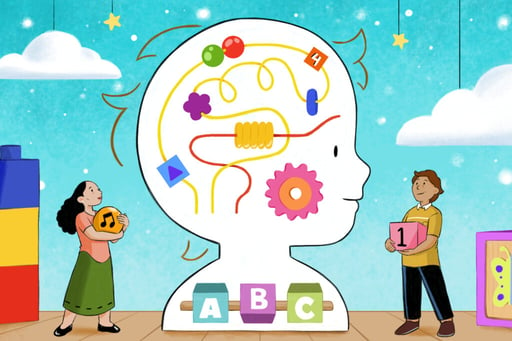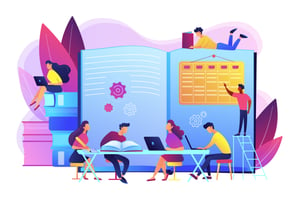Intelligent technologies are going to redefine the way we live, learn and do our jobs. To many, the...
Effective Learning: Here’s How to Study Smarter
As an ambitious student, you must have highlighted certain lines in your textbooks while studying to prepare for the exams. Some of you might have noted down specific points while going through a text, while others might have different ways to keep aside the critical thing that you might want to revise at the end moment. The simple reason why we all used to do and still do these things is to study smartly. Keeping aside important notes, questions or definitions is a common way to enhance your effectiveness for the last moment revisions. However, there are several other ways to focus on effective learning by incorporating intelligent techniques in your study routine.
Since our childhood, we all have been advised to work hard and achieve more.
However, while hard work is undoubtedly the secret ingredient to success that we all know, another one enhances the taste of success – smart work.
While hard work yields better results, smart work helps achieve these results more efficiently, optimizing your best potential to the best use. When both of these combine, you are simply unstoppable!
There is no particular best way to study and learn. However, you can explore and develop your own according to your potential, skills, and pace. It would surely take some time, but each child can recognize their learning rate, potential, and best skills by following and observing their learning pattern for a while. Once you can identify these things, you will quickly formulate the best strategy for your learning and development path. This is what we call, in a nutshell – studying smart! While every student can form their plan for the same, here are a few things that might help you achieve this!
Blog Contents
| Re-reading |
While noting down or highlighting the essential points and re-reading them multiple times can help you grasp them, it might not be the best way to absorb the concept. For example, a recent study of Washington University students revealed that “when students re-read a textbook chapter, they show no improvement in learning.” Therefore, this hard work needs to be changed into “smart work”. This is probably because when students re-read a particular thing, they are reading that with the mindset – “I know this… I know this!”.

Hence, they are not paying much attention to it.
To learn smartly and more effectively, one must move on to this re-reading strategy and focus more on understanding it entirely in the first go.
For this, a student can go deep into a particular topic and stick to it until the concept is completely clear and absorbed. Checking multiple resources and engaging with different forms of the study material can help in achieving this.
For example, after going through the textbook content, a student may watch the video lesson or solve some FAQs about the topic. The unending study resources and video tutorials at KAPDEC might help solve this problem as it provides textual and audio-visual tutorials for a particular topic with complete support from the teacher or the mentor to clear the doubts of the students. Furthermore, solving the questions or taking a quiz at the end of each topic would help identify the gaps in your learning and check your progress.
| Consistency |
“Distributed practice” – spacing out your studying across numerous short periods over several days and weeks – is a very effective learning strategy as per a Newport study. The best way to improve is to dedicate some amount of time each day to one subject. Research suggests that this method of studying takes approximately the same time as two lengthy study sessions at the library. Still, the knowledge you acquire and retain is far more profound, resulting in more effective output.

Not how long you study but how you spend your study time is critical. Long study sessions result in a lack of attention, which compromises learning and retention.
Spacing out your work helps you avoid procrastination as well as understand the topic better.
For example, instead of having to confront the dreadful assignment for four hours in a single day, you may tackle the hard-to-crack question paper for 30 minutes each day.
| New Knowledge relation to Existing One |

Try to connect the concepts discussed in the book and something you are already familiar with. Improve your learning by making connections between new knowledge and what you’ve already learned. This way, you would also revise and re-assert the previously known concepts and become more confident about them. Relating this to the new ideas would also help you understand the logic behind the new concepts or the knowledge.
Understanding the logic and interlinking the information would help you form a picture in your mind based upon a clear understanding.
And no matter if you revise or not, this picture will not fade quickly. Hence, helping you to have an excellent grasp over multiple chapters at once. This way, one piece of information would help you recall the other and so on. Decades of study have demonstrated the need for self-testing to enhance academic achievement.
| Routine |
Though this one may sound cliche, it is true. Your daily routine matters a lot. And when we say routine, it does not only include your study time but your diet, leisure, sleep and exercise way too.
So, plan your day to include most of everything yet in optimum amount.
For example, sleeping for eight hours a day is recommended to keep their brains in the best state. On the other hand, drinking enough water is not just crucial for your body but your academic performance as well.

Keeping yourself hydrated would give you more energy to focus and stay active. Similarly, exercising daily is a crucial part of your daily routine that renders you more than just fitness. Lastly, do not forget to reward yourself for everything you have been doing throughout the day. Having fun or leisure time for yourself should also be on your list!
We are sure that with consistency and observation, you can develop the best routine for yourself!
.png?width=100&height=100&name=Kapdec%20Logo%20(400px).png)


